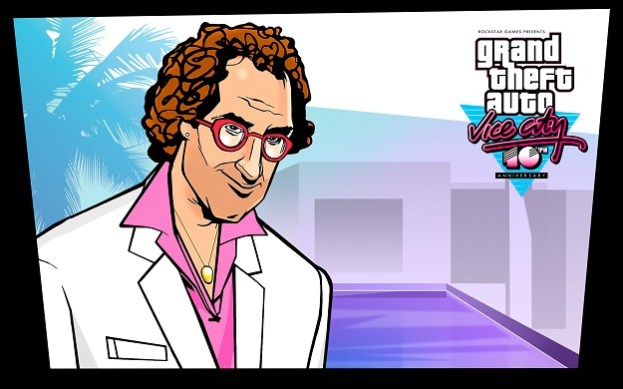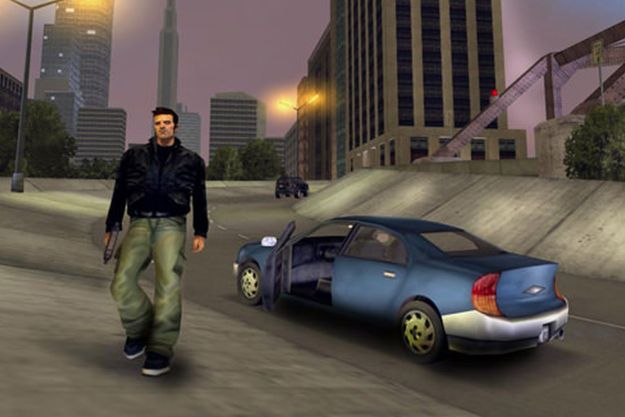

Rockstar producer Leslie Benzies is a busy guy, with a resume that reads like a “best of” list that most developers would kill for. So when we were given an opportunity to put the screws to the head of Rockstar North and lead producer on the Grand Theft Auto series, we jumped on it. Not coincidentally, the interview comes as Grand Theft Auto: Vice City celebrates its 10th anniversary in 2012, and Rockstar Games is marking the landmark occasion with a mobile release of the ’80s-era Miami-inspired classic. (And a note of thanks to Rockstar for supplying us with the exclusive Ken Rosenberg artwork.)
Few people can speak with more authority on the series and the evolution of open-world action than Benzies, who has been a producer on the Grand Theft Auto series since 2001’s Grand Theft Auto 3 shattered gamer expectations of what sort of experiences were possible on a home console. Vice City arrived soon after, delivering an even more personality-driven setting and carrying clear inspirations from various pop culture touchstones. The result was a breakthrough at the time, streamlining the ideas of the previous game while upping the sense of investment as you built Tommy Vercetti’s criminal empire. The game is still a favorite among Rockstar fans, and Benzies was a key player behind that success. Read on as we look back at where Grand Theft Auto has been and where it’s headed a full decade after fans were left wide-eyed by Vice City‘s neon-drenched beach side paradise.
Set the scene for me: it’s 2001 and you’ve just reinvented the open-world action genre with Grand Theft Auto 3. You sit down for your first pre-production meeting on Grand Theft Auto: Vice City. What comes out of that meeting? What did GTA:VC look like when it was just an initial idea on a piece of paper?
We did not really sit down with the intention of making a sequel. After we released GTA3 we spent a few months working on the PC version and then started thinking about things we could put in a mission pack, such as new weapons, vehicles and cool missions, basically anything we had wanted to put into GTA3 but had not been able to do. We realized that there was too much stuff for a mission pack and that it should probably be its own game. We were all on quite a high from finishing GTA3 and I think we all wanted to see where we could take the concept, so the core of the game started falling into place quite quickly.
’80s-era Miami is a very specific point of reference to ground GTA: Vice City in. Where did that come from? What other locales did you toy with as possible sources of inspiration for your GTA3 follow-up?

In the early design meetings there were very few cities and regions on Earth that didn’t get pitched as a potential setting. We thought about revisiting London and a few other places but Sam was very keen on Miami with his love of the Miami Vice series.
We didn’t want to just pick a new city and change the color scheme, we wanted to go somewhere that had both similarities and differences to New York [Liberty City], and that’s what brought us to Miami. New York is busy and bustling, a real merchant city, whereas Miami is a party town, all sun and sea and sex, but with that same dark edge underneath. Also just like New York, it has been used as a setting for some classic film and television, so it was really the perfect fit.
The story in GTA: Vice City continues to be an all-time favorite among fans even now, 10 years later. What do you think it was about the narrative that resonated and continues to resonate so strongly? How have subsequent Rockstar offerings worked to tap into that?
Perhaps more than any of our other games Vice City wore its inspiration on its sleeve. You cannot play for more than five minutes and not think about Scarface or Miami Vice and from that point on you’re playing those roles, and who has never wanted to be Tony Montana on the balcony with his ‘little friend’?
Also GTA3 is a revenge story, whereas Vice City is about building an empire. The assets and businesses you acquire in VC really tie into that narrative and make you feel like a kingpin. In more recent games we’ve tried to keep that sense of progression, that ‘nobody to somebody’ story arc. We still like to show where our inspiration has come from, but perhaps less overtly than in Vice City.
Vice City’s voice cast is overflowing with recognizable Hollywood names, an approach that has been avoided in more recent Rockstar efforts. Can you speak a bit on how the attitude at the studio has changed with regards to casting? What advantages do you think the Hollywood-heavy cast brought to the table at that particular moment in time?

The main issue for us, especially when choosing voice-actors for main characters, is that if you choose a celebrity with a distinctive voice, it can damage the player’s immersion. They’re not thinking “ok, this is CJ,” or “this is Niko,” they’re thinking, “that’s Morgan Freeman.” It’s like when a well-known actor turns up in a cameo in film or TV, you are suddenly very aware that you’re watching a fiction. Because of this we have steered away from celebrity in recent years.
There is also an element of ego that comes along with hiring big-name celebrities. Many of the people we have worked with have been fantastic and a real joy to have on board, but some have perhaps seen themselves as bigger than the project. Our games are made by a team who work themselves to the bone for years, so when a big-shot celebrity turns up, records dialogue for 20 hours and then demands more money and credit than anyone else it can leave a sour taste. When we have worked with lesser-known voice actors they tend to be as proud to be working on the game as we are.
As you’ve looked back on Vice City now, what have you noticed about the game in hindsight that you didn’t necessarily zero in on back in 2002?
I think a lot of us have been surprised at how hard the game is in places. We have been going through the mobile version to balance certain aspects and some of the difficulty spikes in Vice City surprised us, and we designed them. We have always tried to find a balance between challenging the player and not leaving them frustrated, but revisiting Vice City shows that we were not always very good at it!
Any chance that Vice City might return in a future GTA?
It is always a possibility. There are a few references to the city in our current-gen GTAs so it is part of that HD universe, and it is certainly somewhere we would love to revisit. However Vice City, perhaps more than any other GTA game, was as much about the era as the setting. Miami in the 1980’s is so iconic it would feel strange to revisit the city in a different time period.

Of course at some point we would like to have one big world containing all our cities and let the player fly between them and revisit their favorite areas, and in that context reimagining Vice City would be very interesting.
Beyond the new technology being used, has Rockstar’s approach to developing changed significantly since VC was released?
Despite all the technological changes since we made Vice City our design system has remained pretty much the same. We set out the story and mission flow of the game, then see when would be best to introduce new weapons, characters, abilities and so on. We don’t want to overwhelm the player with features too early in the game, but we don’t want to be stingy either. By getting the basic narrative structure and gameplay elements in place early it is easier to control the game’s pacing and keep it consistently tight. When we were designing Vice City there was very little deviation from this initial framework between inception and release, and the same is still true.
This also means that we do not look at the available technology and work out how to build our game around it. We design the game, and then see how we can push the technology to bring it to life.
Rockstar has always been regarded as one of the industry’s edgier developers. The noise has died down in recent years, but how have such experiences in the past shaped the internal approach to concepting and development?
I think the scrutiny we suffered when developing our earlier games has helped keep us creatively sharp. We do not sit down for design meetings and say, “let’s make the most appallingly violent game possible.” We choose to set our games in places where violence is or was a part of everyday life, the Old West or the criminal underworld or cocaine-flooded Miami. If we censored ourselves and sanitized the violence we would not be able to properly explore these settings and themes, and make the games we make. That is a compromise we have never been willing to make.
Also I think that a decade or so ago, games were still a soft target, a way to sell newspapers. The majority of people saw them as kid’s toys and were outraged when the details of our games were laid out to them. Today games are a massive part of our culture. People know that games are no longer all about eating dots or blowing up spaceships, that they can be dark and edgy and challenging.
Can fans look forward to seeing additional mobile development initiatives from Rockstar moving forward? Perhaps even something in the realm of all-new original content?
There are certainly a number of our previous titles we would like to see on tablets and mobiles, since it is essentially a whole new audience for them. Also the power of mobile technology is increasing so rapidly it is hard to imagine the kind of games we could be releasing for them in years to come. Whether these are repurposed versions of existing games or entirely new IPs I couldn’t say, but if you look at Chinatown Wars you can see that we are always up for the challenge of designing games for new technologies and making the most of all their features, not just their processing power.

With the core systems in place we were really able to let our creativity run wild and try out all sorts of new ideas. After the excellent reception we received for GTA3 we knew gamers liked what we were about, so it felt like a chance to really push ourselves to create something even better. The development of Vice City escalated so quickly from mission pack to full-blown game that the whole process was a bit of a blur, so I’m still proud that we pulled it off and made a game that people enjoy as much as they do.
What sets this mobile edition of GTA: Vice City apart from its console predecessors?
There are a few core mechanics that we have reworked, such as the camera and aiming system, to better suit the platform. We have also made a few adjustments to certain missions and mechanics to make the game a bit more forgiving and a bit more accessible. This reflects the fact that we are selling to a different demographic. On the consoles this was a game people would sit and play for hours, but now it is a game we want people to be able to pick up for 10 minutes on their commute. We didn’t want people to be sat on the bus grinding cash or replaying a mission 20 times to progress. We want them to get home and say “Hey I bought a nightclub and robbed a bank on the way home, how was your day?”
Editors' Recommendations
- The hacker who leaked Grand Theft Auto VI has been sentenced
- 5 key details we noticed in the first Grand Theft Auto 6 trailer
- Grand Theft Auto 6 trailer: when it’s coming and how to watch
- We need to see these 3 things in Grand Theft Auto 6’s first trailer
- Grand Theft Auto 6 is getting its first trailer sooner than you think

